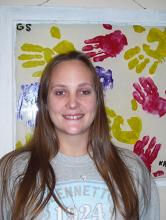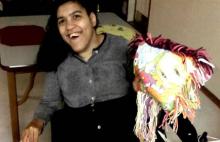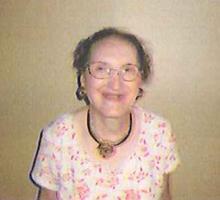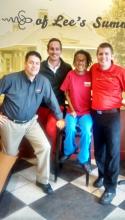"Sharing Success" Stories
The Department of Mental Health is sharing the many success stories of its clients and consumers from across all the divisions. Many receiving mental health services in Missouri have made great strides to not only make life better for themselves, but their accomplishments help make a difference for others around the state.

Michelle
This is the success story of Michelle. Not long ago, Michelle, 33, was living in a nursing home. She spent her days between a wheelchair and her bed, with little communication and interaction with her surroundings. A DMH service coordinator from the Sikeston Regional Office connected with Michelle and realized immediately that the nursing home was not an appropriate living environment for her. The service coordinator talked with the guardian and was able to move Michelle into an Individualized Supported Living (ISL) arrangement using the Money Follows the Person funding program. That is where Michelle’s success began.
“When I first met Michelle she was a year younger than me and I couldn’t imagine living in a nursing home at that point in my life,” said Lori Copeland, service coordinator.
The Money Follows the Person program allowed the funding that had been paying for Michelle’s nursing home care to be used to support her in the community. Today she is doing very well in her new surroundings. She seldom needs the wheelchair anymore, except when she goes places that requires extended walking. She carries on conversations now and expresses her wants and needs. She talks and smiles as never before. Thanks to alert and compassionate service coordinators at Alternative Opportunities in Sikeston, Michelle was given the opportunity to begin again and live her life to her fullest potential. And that is a success story worth sharing.

Chantelle
Turning one’s life around is never easy, and assistance with making life-changing decisions through the Department of Mental Health system can come in many forms. For Chantelle, the key to reversing her struggle came in the form of the Comprehensive Substance Treatment and Rehabilitation (CSTAR) program.
When Chantelle entered the adult CSTAR treatment program operated by Preferred Family Healthcare in 2011, she was admitted on a furlough from jail pending charges for manufacturing methamphetamine. She had just been evicted from her apartment, was unemployed, pregnant, and dealing with a custody case regarding her oldest child. Despite all these obstacles, Chantelle never gave up. During her stay in treatment, she was able to get food and housing assistance, enroll in drug court and attend as many AA meetings as she could. During outpatient treatment, Chantelle continued to be up-beat and focus on her long term goals of having her family under one roof, getting a new job and remaining drug-free.
Chantelle had her baby in January of 2012 and today has continued to be successful in her recovery with the help of the community support staff at Preferred Family Healthcare. She has held a satisfying job in Kirksville for nearly a year; she has full custody of her children; she successfully completed treatment; and is setting new goals for her ongoing recovery. Someday Chantelle hopes she can become a counselor so she can give someone else the kind of help she received.
James
When you meet James today, he is a very different man than he was several years ago. James first began to notice symptoms of his mental illness when he was a child, but he never told anyone about it. He seemed to be able to manage the symptoms, which included hearing voices, until he became a teenager. Then James turned to alcohol and drugs to cope. Using many kinds of substances led James down a dark path for a long time. James became hurtful to his family, physically and emotionally.
After years of continued substance abuse and failure to get the help he needed for his schizophrenia, James hit bottom when he became dangerous to his family and himself. James’ mother stepped in and he was admitted into a secure mental health facility. There he began receiving treatment for his mental illness and became sober. He decided this would be a turning point in his life.
James stepped down from a maximum to intermediate security area, and then into minimum security. He continued to work hard, take his proper medications and fully participate in all his classes and groups. After a few years James was granted an unconditional release and he eventually earned custody of his kids. James has been free for more than two years and out of the hospital more than 7 years. He takes his medications so he no longer hears voices and he no longer has urges for harmful behavior.
James feels as though he can hold his head high today. He feels respected and remains involved in the Family Counseling Center clubhouse in Kennett where he serves on two committees, helping those who are struggling with drugs and alcohol as well as mental illness, just as he did. James takes great pride in his recovery efforts and enjoys being a mentor.

Jane
Jane is a young lady who makes people smile. Jane lives in Kansas City in a group home owned by the Center for Developmental Disabilities (CDD). She has been there for more than six years and is described as having many wonderful talents. Jane works very hard to use those talents creating items to make others happy. Jane loves to knit, even though she is limited by her ability to use only her right hand. She has made numerous scarves, hats, and her favorite - baby socks, plus much more.
Not only does Jane make beautiful knitted creations, but she holds classes for other residents at the CDD so they can learn how to knit. It has always been Jane’s dream to teach and she is finally seeing that dream come true. She also takes additional classes in the community to acquire more knowledge about knitting as well as learn to draw and paint.
Everyone who knows or works with Jane describes her as a caring and loving person. She recently used her own money to purchase supplies for her knitting class at the CDD. She wants all her students to be successful and make what they want. Jane’s peers are incredibly proud of her and love to see her soaring to new heights. She is a wonderful example to all of us.
Machael
Machael describes her childhood and teen years as a struggle. She was in and out of foster care and group homes until she was old enough to be on her own. But despite the lack of a stable family home, Machael received her high school diploma and went on to obtain some business school training as well.
Machael has three children, two of whom are from a previously, abusive relationship. She came to realize it was not a good relationship for her or the children, so through self-determination she got herself out of that situation. Being a strong-willed woman, Machael worked hard to get her driver’s license and eventually bought a car. She also got a job in food services.
But Machael felt she needed more help, so she turned to Pathways in Clinton for some guidance on how to cope with her daily personal and family challenges. After successfully finishing her program there, she looked for employment opportunities. Machael has been working at Pathways Community Health Center as a Peer Specialist for about a year now. Her hard work, determination and success in finding help, has given her the tools she needs to be emotionally stable and provide for her family. Great job, Machael!
Stacy
For as long as Stacy can remember, she has always struggled to fit in socially. She was diagnosed in middle school with autism spectrum disorder (ASD). As she grew into an adult, the challenges of ASD kept her from being able to succeed professionally. Stacy obtained three jobs but was unable to keep them primarily due to problems interacting with coworkers, supervisors, and customers.
Stacy began receiving services from Alternative Opportunities (AO), which helped her develop social and interpersonal skills and find a job. For nearly two years now, Stacy has been working at Crossmark, providing direct customer service and sales to the public. This is no small feat for someone with ASD, a disorder which often causes significant barriers with social interactions and communication.
Through AO’s programs, Stacy also participated in mock interviews, role playing customer service exercises, and additional social skill development activities. Stacy also received one-on-one support both on and off the job. She was able to meet with her Job Developer almost daily for the first several weeks of her employment to provide feedback regarding her job.
Stacy’s success is also seen as a large return on investment for the Southwest Missouri Autism Project which helps fund her services. Stacy is currently earning $10.50 per hour, is working approximately 20 hours per week, and has earned almost $20,000 since becoming employed. This is money that otherwise would have not been available to Stacy or her family.
Stacy said, “I really like my job and I’m learning to make friends in a positive way. I’m learning how to have normal conversations and not try to make stories up to fit in.” Way to go, Stacy!

Helen
Helen is 73 years young and celebrating 40 years at the same job! Helen started at the Community Workshop in 1973 and, as long as she can still work, has no plans of retiring! Her job is a point of satisfaction that she is still productive. She has many friends at work and enjoys socializing with them there. She looks forward to going to work every day and very seldom misses.
Several years ago a search was conducted to see if Helen had any living blood relatives. Her support coordinator of 13 years located a brother who had died just 3 months before they located him.But Helen has not been without family - she has lived in the same foster group home for more than 42 years. Her current provider, Betty, has been Helen’s family for many years.
Betty says, “It seems like Helen has always been a part of our family. We grew up together.” Betty’s children’s and grandchildren know her as “Aunt Helen.”
She is always wearing a big smile and is a joy to be around. Helen’s story of success is being happy, and productive as she is surrounded by people who love and care about her.

Tionna
Tionna (also known as Miss T) had a difficult time as a child in a regular school setting. She was either ill from being around other children or just not comfortable in the public school environment. Her mother decided to homeschool her and did a great job. Tionna’s mother also worked hard to find volunteer opportunities to help her transition from high school to adulthood and community employment.
Tionna volunteered to work in a variety of places building new skills for employment each step of the way. Her early volunteer jobs included basic store cleaning for The Style Room, organizational work at the Mid-Continent Public Library in Lee’s Summit, assisting residents at the John Knox Village retirement center and assembling grief packets for family members at The Good Shepherd Hospice.
After getting this great practical experience, Tionna began to work with an employment specialist at KC Rehabilitation Institute who introduced her to the managers at McAlister’s Deli. Tionna won them over with her personality and landed her first paying job.
One manager said, “The staff loves her! She’s fantastic! We love her to death. She helps our business… she improves our atmosphere.”
In addition to her job, Tionna also volunteers her time with Kids as Self-Advocates (KASA) and the Regional Advisory Council (RAC) for the Department of Mental Health. In these groups she is able to enthusiastically share her experiences and suggest ways to improve the supports for individuals with disabilities.
Tionna is full of promise because of her drive, ambition, support, vision and acceptance in the community. Way to go Miss T!
